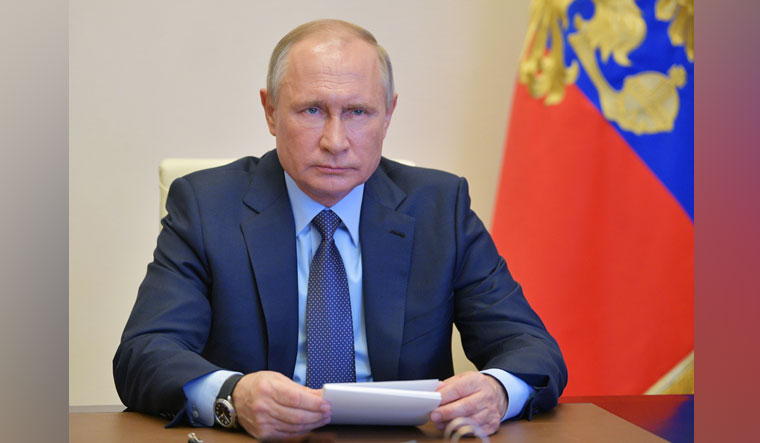On November 9, the president of Armenia, the Prime Minister of Azerbaijan and the President of Russia all agreed to stop the fighting in the Nagorno-Karabakh region. The end of hostilities, brokered by Russia, comes with Armenia agreeing to cede several territories in the unrecognised Republic of Artsakh—located within Azerbaijani-claimed territory—to Baku.
“A complete ceasefire and all hostilities in the zone of the Nagorno-Karabakh conflict are announced from 00:00 hours Moscow time on November 10, 2020. The Republic of Azerbaijan and the Republic of Armenia, hereinafter referred to as the Parties, stop at their positions,” the joint statement says.
“The Aghdam region and the territories held by the Armenian Party in the Gazakh region of the Republic of Azerbaijan shall be returned to the Azerbaijan Party until November 20, 2020,” it added. These territories were lost by Azerbaijan to Armenia in the 1988-94 conflict.
In addition, transport links will be set up linking Azerbaijan to its exclave of Nakhcivan located in the western part of Armenia, containing Azerbaijan’s only border with Turkey.
As part of the peace deal, Russia will conduct a peacekeeping operation in Nagorno-Karabakh, deploying 1,960 peacekeepers, 90 armoured vehicles and 380 vehicles and pieces of special equipment, to be deployed under a five year mandate. Russian observation posts will be set up along the contact line in Nagorno-Karabakh as well as along the critical Lachinsky corridor connecting Artsakh to Armenia, which will continue to remain under Armenian control and which will be protected by Russia.
10 IL-76 planes have already been dispatched bearing troops and vehicles to the region.
Armenian President Nikol Pashinyan posted about the deal on Facebook, describing it as “unspeakably painful” but said the decision was taken after a “deep analysis of the military situation” and an assessment by “people who know it better than anyone”.
"We need to analyze our years of independence to plan our future and not repeat the mistakes of the past," he added.
Azerbaijan had recently captured the Artsakh city of Shushi, and their forces were enroute to the capital of Stepanakart when the peace deal was announced.
Anger erupted in Armenia’s capital, Yeravan, after the announcement. Angry protesters who felt the deal was a humiliation for Armenia stormed the country’s parliament, dragging Speaker Ararat Mirzoyan out onto the streets and assaulting him. Mirzoyan has since been hospitalised and underwent a surgery, with President Pashinyan saying his life is not under threat.
For Armenia, the outcome reflects military defeat at the hands of the larger and better-equipped Azeri and Turkish combine. Azerbaijan notably made use of Israeli-supplied drones to destroy Armenian tanks and vehicles, including the IAI Harop ‘suicide drone’ and Orbiter 1K.
The deal comes a day after Azeri forces ‘accidentally’ shot down a Russia Mi-24 helicopter which was escorting Russian forces to a military base located in Armenia. Baklu has apologised for the incident and has promised to pay compensation.
While Russia did not intervene in the conflict, Armenia is its strategic ally under the Collective Security Treaty Organization. Russia is bound to defend Armenia should its own legal territory be attacked. However, the Nagorno-Karabakh region has always been recognised as part of Azerbaijan and thus Russia did not intervene. In addition, Russia’s relations with Armenia had cooled since the election of PM Pashyin following street protests in 2018.
According to Nicu Popescu in an article published on the European Council on Foreign Relations website, Russia’s displeasure also stems from a perceived Armenian inflexibility in past negotiations. Under the 2011 Madrid Principles, Armenia was to cede control of seven districts around the Nagorno-Karabakh region and engage in talks; Yerevan instead opted to maintain the status quo.
The end of the 2020 Nagorno-Karabakh conflict favours Azerbaijan. In Baku, the deal was hailed as a victory for Azeri forces. Turkey hailed Azerbaijan’s “significant gains” from the conflict, with Foreign Minister Mevlut Cavusoglu tweeting “Our dewar Azerbaijan achieved significant gains in the field and at the [negotiating] table. I wholeheartedly congratulate this blessed success.”
Turkey has denied charges by France and Russia that it ferried militants from Syria to support Azeri troops.





